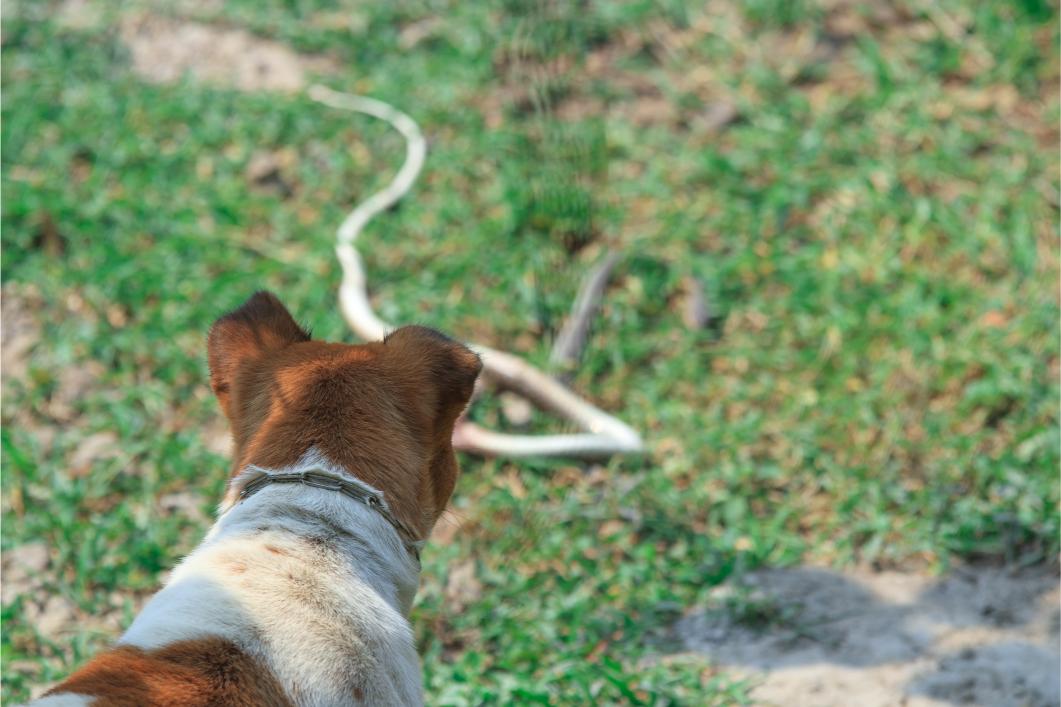Snake Safety in Southlake: Mobile Vet Tips to Keep Pets Safe

Southlake’s sunny skies make it a paradise for outdoor-loving pets—but they’re not the only ones who enjoy the warm weather. Venomous snakes in Texas also become more active as temperatures rise, and that can spell danger for curious cats and adventurous pups. At The Vet Gal and Guys, we know how important it is to protect your pets from wildlife hazards, such as snake bites.
Let’s talk about how to keep your pets safe, what to do if they cross paths with a snake, and how our mobile vet team can help when time matters most.
Know Your Neighbors: Venomous Snakes in Texas
Texas is home to several venomous snake species, including:
- Western Diamondback Rattlesnakes: These are the most commonly encountered venomous snakes in the state. Their distinctive rattle is a clear warning—if you hear it, steer clear.
- Copperheads: With their coppery coloring and preference for wooded areas, copperheads are often well-camouflaged and easy to overlook.
- Cottonmouths (Water Moccasins): Typically found near water, these snakes are known for their defensive posture and gaping, white mouths.
- Coral Snakes: Rare but recognizable, coral snakes have bright red, yellow, and black bands. If your pet spots one, distance is key.
Snake encounters can happen in backyards, along trails, or even during a simple potty break. That’s why pet outdoor safety is so important year-round in Southlake.
Snake Bite in Pets: Signs to Watch For
A snake bite may not always be obvious, especially if your pet has a thick coat. If you think your dog or cat may have been bitten, watch for:
- Sudden swelling (especially on the face, legs, or paws)
- Puncture wounds or bleeding
- Whimpering
- Rapid breathing or drooling
- Limping
- Weakness or collapse
Snake bite pets need immediate veterinary care, especially if the snake was venomous. Don’t wait—call us right away.
Outdoor Safety Tips to Prevent Snake Encounters
You can’t eliminate every risk, but a few smart habits go a long way in reducing your pet’s chances of a snake encounter. Here’s how to make your yard and walks safer:
- Keep grass trimmed and clear brush piles or wood stacks where snakes might hide.
- Walk on paved paths whenever possible, and avoid areas with tall grass or undergrowth.
- Use a leash to maintain control when you’re out walking or hiking.
- Supervise backyard time, especially in the early morning or evening when snakes are most active.
- Teach the “leave it” command to help prevent pets from investigating unfamiliar creatures.
With a bit of preparation, you can enjoy Southlake’s outdoors without constantly worrying about what’s slithering in the bushes.
What To Do in a Snake Bite Emergency
If your pet is bitten by a snake:
- Stay calm and keep your pet still and quiet to slow the spread of the venom.
- Do not try to suck out the venom or apply ice, a tourniquet, or alcohol.
- Call The Vet Gal and Guys immediately during business hours, Monday through Friday, from 8 a.m. to 5 p.m. We’ll advise you about what to do next and arrange mobile vet emergency care if needed.
- After hours, call Animal Emergency Hospital of North Texas at (817) 410-2273. They’ll provide records from your visit to ensure continuity of care.
Fast action can make all the difference when it comes to snake bites.
We’re Here When It Counts
Our skilled team is trained to respond to pet wildlife hazards and urgent situations with the attention your furry family members deserve. Call us today at (817) 733-3011 to schedule a wellness visit or learn more about our mobile vet emergency care services. We’re always happy to help keep your pets safe and healthy, wherever adventure takes them.


